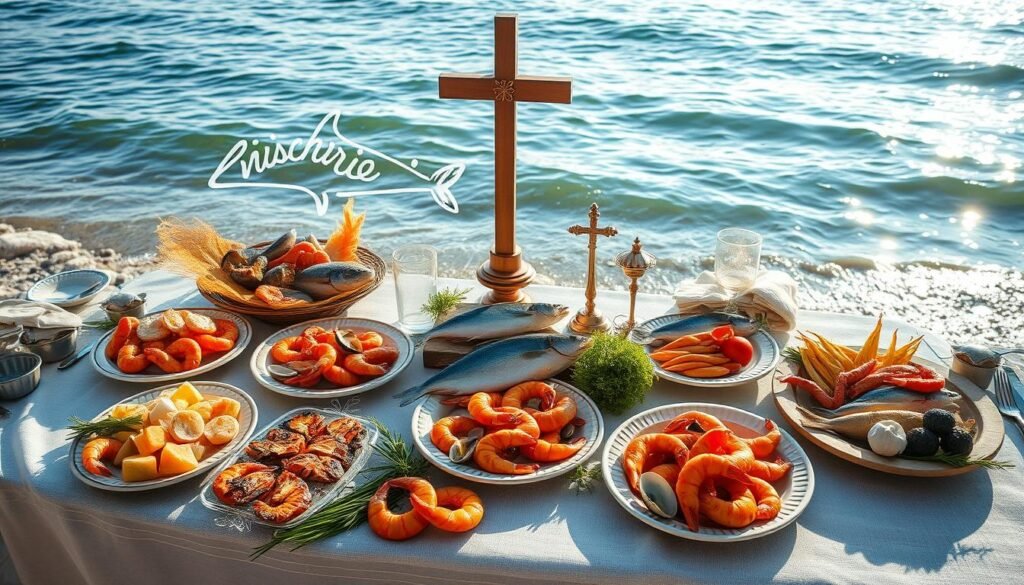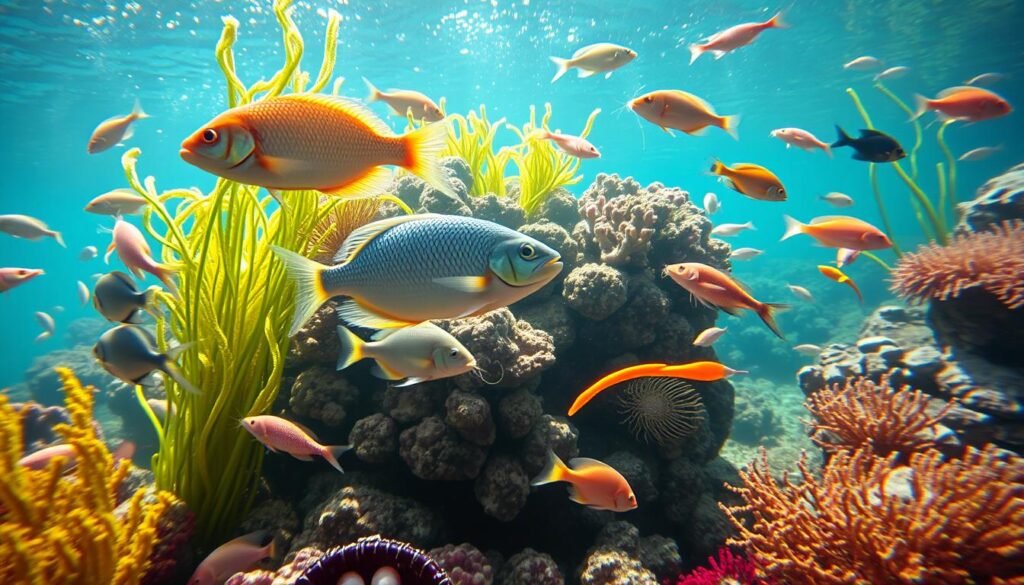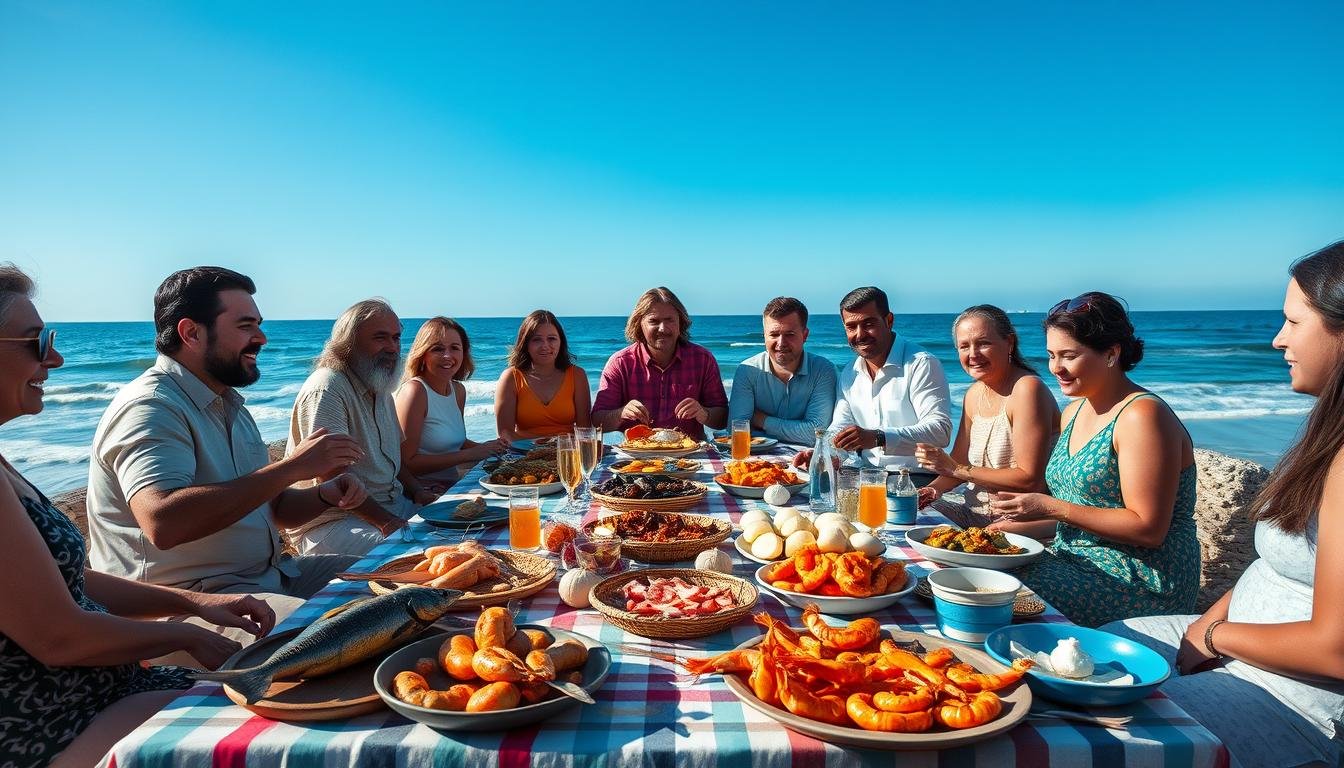Many wonder if eating seafood goes against Christian values. This question dives into the world of food rules in the Bible. It shows how different people see these rules in their own ways.
The Bible has a lot to say about seafood. It talks about old rules from the Old Testament and new views in the New Testament. We will look into these rules and question what they mean for us today.
Understanding Dietary Laws in Christianity
Christian dietary laws come from the Bible. They have changed over time, especially from the Old to the New Testament. Different churches have their own ways of following these rules, which affects what people eat.
The base of these dietary restrictions is in Leviticus 11. It lists which animals are okay to eat and which are not. This was to show God’s chosen people were different from others. It was about being holy because of their covenant with God (Leviticus 11:46).
But, the New Testament says these laws are not as important anymore. Mark 7:19 and Acts 10 explain this change. It shows how early Christians saw diet differently.
Trying to understand these rules can help people eat better and stay true to their faith. The old rules still offer wisdom for today’s diets. For more on Christian dietary laws, check out this detailed resource.
The Old Testament and Food Restrictions
The Old Testament has rules for what foods are okay for the Israelites. Leviticus 11 and Deuteronomy 14 tell us which animals are clean or unclean. These rules were key for the Jewish people and their bond with God.
The Laws in Leviticus
In Leviticus 11, God talks about food rules. He says some animals are not okay to eat. This includes seafood like shrimp, crab, and lobster because they don’t have fins and scales.
These laws helped the Israelites live differently. They showed they were serious about following God’s rules.
Deuteronomy’s Dietary Guidelines
Deuteronomy 14 also talks about food rules. It says the same things as Leviticus 11. It reminds us to follow these rules as part of our faith.
God wanted the Israelites to be different from other nations. He wanted them to keep their unique identity.
New Testament Perspectives on Food
The New Testament brings a big change in how we see food. Jesus and the apostles taught us new things. They said it’s more important to be clean inside than to follow old rules about food.
This new view means we don’t have to stick to strict food rules. It lets us enjoy more foods. It’s all about being healthy in spirit, not just following rules.
Teachings of Jesus on Clean Foods
In Mark 7:18-19, Jesus said,
“Are you so dull? Don’t you see that nothing that enters a person from the outside can defile them? For it doesn’t go into their heart but into their stomach, and then out of the body.”
He meant that all foods are okay. It’s not about what we eat, but how we feel inside. Jesus wanted his followers to be free from strict food rules.
Apostolic Guidance in Dietary Choices
The apostles also taught about being free in food choices. Paul wrote in his letters that all foods are good. In 1 Timothy 4:3-5, he said,
“For everything God created is good, and nothing is to be rejected if it is received with thanksgiving.”
This shows that Christians can enjoy God’s gifts without strict rules.
In Acts 10, Peter had a vision that changed how the early church saw food. Paul also taught that we should not judge others for what they eat. He said this in Colossians 2:16.
So, Christians should make food choices that bring peace and love. We should also treat all living things with kindness.
Can Christians Eat Seafood?
Christians often wonder if they can eat seafood. The Bible gives clues in the Old Testament. Leviticus 11:9-12 and Deuteronomy 14:9-10 say what’s okay. Sea creatures with fins and scales are good to eat.
But, the New Testament changes things. Jesus talks about it in Mark 7:14-19. He says it’s not what we eat that matters, but how we act.
Romans 14:14 says no food is bad. This means Christians can choose what they eat. They can eat seafood if they feel it’s right for them. So, while the Old Testament was careful, today’s Christians are more open to seafood.

Covenants and Their Impact on Dietary Laws
Biblical covenants are key to understanding dietary laws for Christians. There are two main covenants: the Old Covenant with the Israelites and the New Covenant by Jesus. Each has its own dietary rules and shows how God’s relationship with people has changed.
Overview of Biblical Covenants
The Old Covenant had strict food rules for the Israelites. They couldn’t eat certain animals like pigs and shellfish. These rules showed they were different from other nations and followed God’s commands.
The New Covenant changed these food rules. With Jesus, believers no longer had to follow the Old Covenant’s strict laws. This change made food choices more open for Christians.
Differences Between the Old and New Covenants
The Old vs New Covenant shows a big change in food rules. Jesus taught that all foods are okay. This idea came from a vision Peter had in Acts 10.
The New Covenant fulfills the Old through Jesus’ sacrifice. It brings a new way of thinking about food. Believers can now choose what they eat, showing God’s grace and acceptance.
What the Apostles Said About Eating
The apostles taught us about food in a new way. After the flood, God let people eat all kinds of animals. This was a big change from eating only fruits, veggies, and herbs before.
In Acts 15, the apostles talked to the Gentiles. They told them to avoid some things but not to follow Jewish food laws. This showed that the early church was free to eat what they wanted.
Paul wrote letters that said food doesn’t make us separate from God. Romans 14 says Christians don’t have to follow certain food rules. 1 Timothy 4:1-5 says every creature is good to eat if we thank God for it.
The early church saw food in a special way. They believed in eating to nourish the soul, not just the body. They thought that food was a way to thank God and bring people together.
Denominational Views on Seafood Consumption
Christian groups have different views on eating seafood. Some allow a variety of foods, including shellfish. Others follow strict rules based on the Bible. These rules change a lot between different groups.
Varied Dietary Practices Across Denominations
Christian groups have their own food rules. Some see seafood as a good protein choice. Others avoid certain seafood because of the Bible.
The Bible talks about clean and unclean animals. This affects how people think about seafood. People make food choices based on their beliefs, health, and the Bible.
The Example of Seventh-day Adventists
The Seventh-day Adventists have strict food rules, especially about seafood. They don’t eat shellfish or other animals the Bible calls unclean. This shows their care for health and body.
They believe in eating in a way that honors their faith. They think about their food choices carefully. This is important in today’s world.
Defining Clean and Unclean Animals
The Bible says some animals are clean, others are not. This is based on Leviticus 11. Clean animals are okay to eat. They must have scales and fins if they live in water. Or, they must have hooves and chew their cud if they live on land.
Examples of clean land animals are cattle and deer. Some birds, like chickens, are also clean.
Criteria Established in Leviticus
Leviticus 11 tells us which animals are clean. It says pigs and shellfish are not clean. Some birds, like eagles, are also not okay to eat.
Animals that don’t meet these rules, like rabbits, are not clean. But animals that do, show God’s holiness. These laws are not just about food. They help people live a holy life.
Modern Interpretation of Clean Animals
Today, Christians see these laws differently. Many think the rules in Leviticus 11 are not as strict. This is because of the New Testament.
Acts 10:9-16 shows a change in thinking. Peter had a vision that made him see things differently. Now, Christians can eat more freely. They understand these laws help them live a good life, not just follow rules.

Ethical Considerations in Seafood Consumption
Thinking about the rightness of what we eat is important for many Christians. Ethical eating makes us think about how our food choices affect the world. This is especially true for seafood, where we must consider the planet and people.
Christian values guide us to make food choices that are right. We should think hard about where our food comes from.
When we eat seafood, we face big questions. Fishing that’s not good for the planet can hurt oceans and people who live near them. Choosing seafood that’s good for the planet is a way to follow our faith.
It’s not just about the planet. Many places make sure fish are treated kindly. By choosing seafood that’s treated well, we show our faith in action.
Talking about eating right helps us all grow. It makes us better caretakers of God’s world. This helps us and our community too.
Seafood in Christian Tradition and Rituals
Seafood is special in Christian traditions, especially in early Christianity. It shows how rituals have shaped our spiritual and communal lives. In the early days, seafood was shared in Eucharistic meals, bringing believers together.
This tradition of seafood in rituals shows our values of sharing and remembering. It’s a way to connect with each other and our faith.
Historical Context of Seafood in Early Christianity
Seafood was key in early Christian gatherings. Followers followed dietary laws, making fish a common choice. This tradition helped them enjoy meals that respected their culture and faith.
Seafood in rituals balanced tradition and change. It let early Christians fully join in worship and faith.
Significance of Seafood in Christian Feasts
Seafood is a big deal in Christian feasts, showing its importance in celebration and remembrance. For example, in the Roman Catholic Church, seafood is eaten on Fridays, especially Good Friday. This honors Jesus’ crucifixion.
Sharing seafood in these times creates a sense of community. It strengthens our bond and encourages spiritual reflection. Seafood adds depth to Christian feasts and traditions, linking food choices with faith.
Nutritional Aspects of Seafood in Christian Diets
Seafood is full of nutritional benefits that fit well with Christian diets. It has omega-3 fatty acids, vitamins, and minerals. These help keep your heart healthy and fight inflammation.
The Bible talks about what foods are okay to eat. It says clean seafood must have fins and scales. This shows the importance of choosing the right foods for health and faith.
Lent is a time when people eat more fish. This means they get more good nutrients. Different Christian groups also push for healthy eating. You can learn more at this link.
Studies show that going to church can make people eat better. People who go to church often eat more nutrients. This shows how faith and food choices are connected.
Conclusion: Balancing Faith and Diet
Christians today can enjoy seafood and still be true to their faith. The rules in the Old and New Testaments are more than just old customs. They guide us on what to eat, showing us to follow our spiritual values.
Some think the New Testament means we don’t have to follow old rules anymore. But it really helps us understand what’s important. For example, 1 Corinthians 10:27 tells us to be open and welcoming when we eat together.
Christians should follow the Bible’s food rules. This helps us show our faith in what we eat. It makes us good examples of Christ’s love. By doing this, we can live our faith and enjoy life together.
FAQ
Can Christians eat seafood according to the Bible?
Yes, Christians can eat seafood. The Old Testament says seafood must have fins and scales to be clean. But the New Testament, especially Jesus’ teachings, says all foods are clean now. This means Christians can eat a variety of foods, including seafood.
What do dietary laws in Christianity entail?
Christian dietary laws vary but are based on the Bible. The Old Testament has strict rules. The New Testament talks about being free from these laws. It focuses on being pure inside and being thankful.
What do Leviticus and Deuteronomy say about clean and unclean animals?
Leviticus 11 and Deuteronomy 14 explain what animals are clean or unclean. Seafood needs fins and scales to be clean. Shellfish and others are not. These laws help God’s people stay different.
How does Jesus reinterpret food laws in the New Testament?
Jesus says all foods are clean in the New Testament. This change is in Mark 7:18-19. It’s not about what you eat, but what comes from your heart. This gives more freedom in what you can eat.
What is the apostolic perspective on eating practices?
The apostles, like Paul, say Christians have freedom in what they eat. 1 Timothy 4 and Acts 10 say all foods are good. They teach that old dietary laws don’t apply anymore.
Are there different views among Christian denominations regarding seafood consumption?
Yes, different Christian groups have different views on seafood. Some groups eat a wide variety of foods, including shellfish. Others, like the Seventh-day Adventists, follow stricter rules from the Old Testament.
How do modern Christians interpret Old Testament dietary laws?
Modern Christians see the Old Testament laws as not binding anymore. They look at the New Testament for guidance. This lets them choose what to eat, including seafood, based on gratitude and faith.
What ethical considerations are associated with seafood consumption?
Thinking about seafood involves sustainability, the environment, and treating seafood sources well. Christians consider how their food choices match their faith. They want to care for God’s creation.
What role does seafood play in early Christian traditions?
Seafood was important in early Christian traditions. It was often eaten together in meals and rituals. This shows the value of sharing meals and being together in Christian worship.
What are the nutritional benefits of seafood in a Christian diet?
Seafood is full of good stuff like omega-3s, vitamins, and minerals. Eating seafood can help you stay healthy. It’s good for your body and spirit.

Rockin’ the faith, one verse at a time!
Growing up, the Bible’s stories deeply impacted me. Now, with over 15 years of preaching experience, I blend timeless teachings with modern technology, making them relevant for today’s world.
Bible Hub Verse is my platform to share historical insights and thought-provoking articles, exploring both familiar and uncommon Christian topics. My passion is building a welcoming online space for everyone to learn, grow in their faith, and discover the Bible’s enduring message.
Join the journey!
God bless you.









